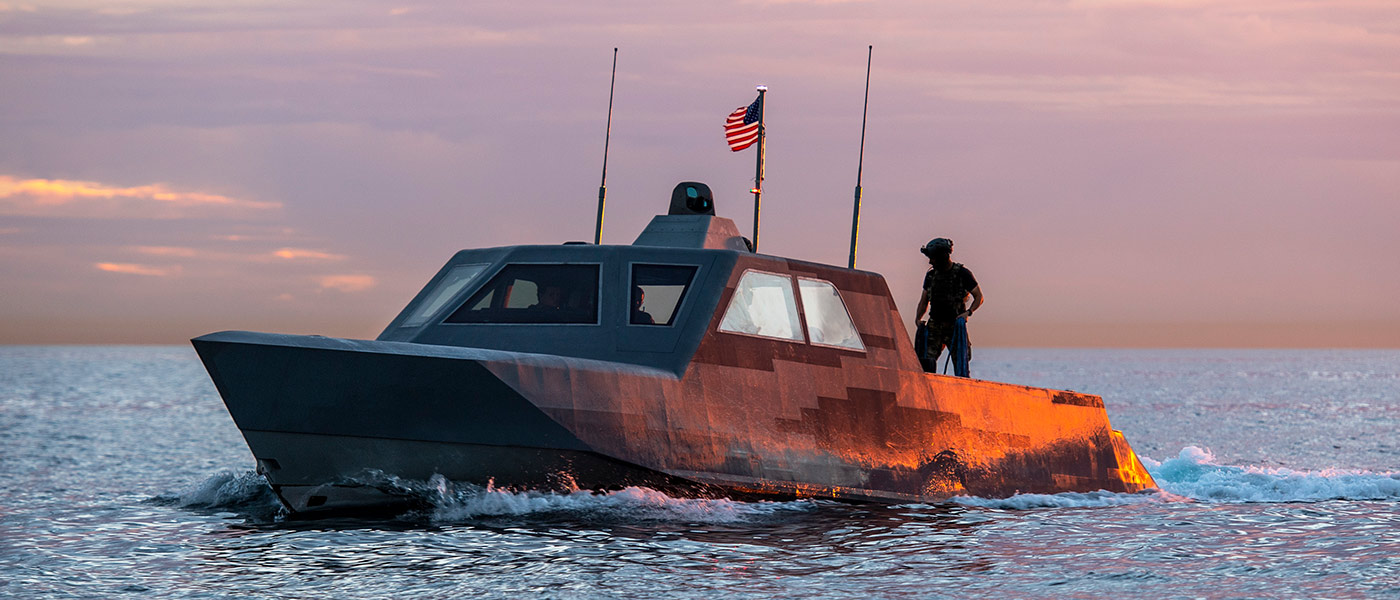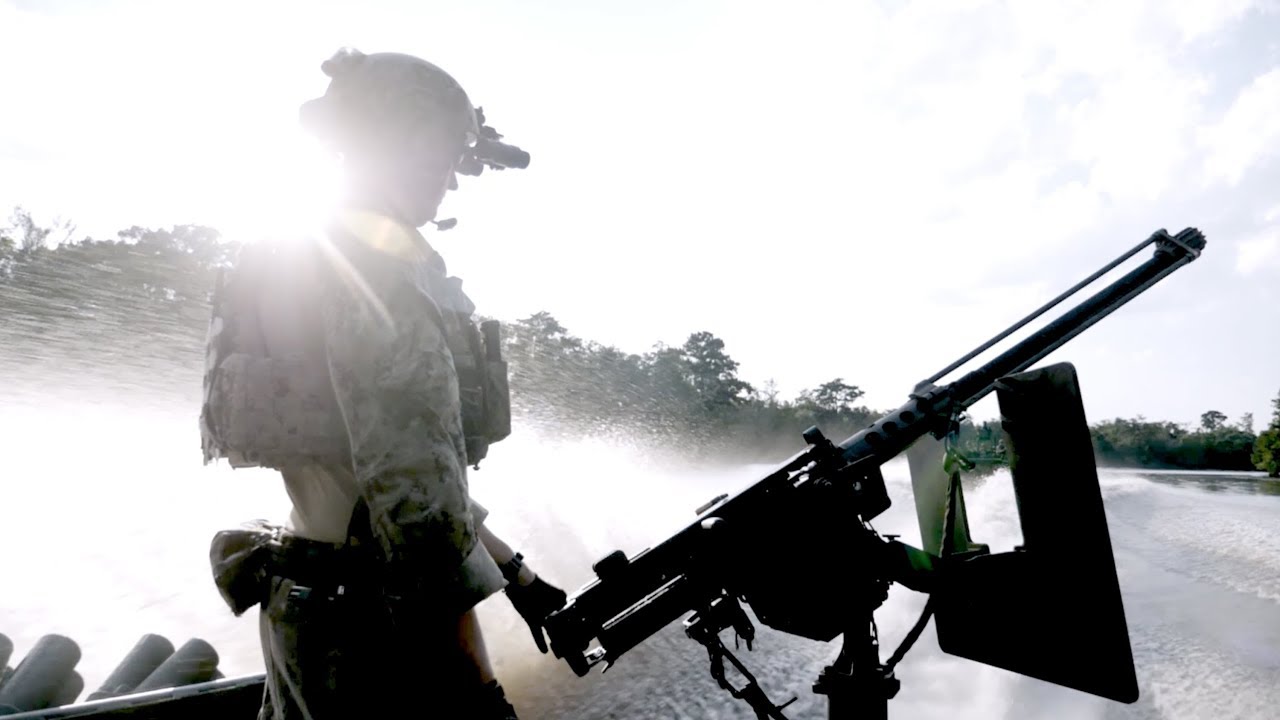WATCH VIDEOS ABOUT SWCC
SWCC: CAREER DETAILS & REQUIREMENTS
Responsibilities
SWCC are extensively trained to execute high-risk warfare and reconnaissance missions in river and coastline settings. As a member of this tightly-knit community, you may:
- Insert and extract SEALs and other Special Operations personnel from a variety of Naval Surface Warfare vessels
- Collect important data about enemy military installations and shipping traffic in coastal areas
- Assist other military and civilian law enforcement agencies
- Operate and maintain ordnance systems, communications, electronics, small boats and other equipment associated with SWCC and other special operations missions
- Perform direct action raids against enemy shipping and waterborne traffic
- Provide rapid mobility in shallow water areas where larger ships cannot operate
- Integrate with other U.S. Special Operations forces or within U.S. Navy carrier and expeditionary strike groups to accomplish operational tasks
Work Environment
Special Warfare Combat Crewman undertake missions the U.S. Navy keeps very quiet because of how vitally important they are. They are extensively trained to execute high-risk warfare and reconnaissance missions in river and coastline settings. SWCC operators may be deployed anywhere in the world and operate day or night in cold weather, desert, tropical or jungle environments. Though much of your time will be spent training or in the field on missions, you may work in an office on administration duties from time to time. As the Sailors who insert and extract Navy SEALs from classified locations around the world, they are true warriors—highly trained, disciplined and distinguished.
Training & Advancement
As a SWCC operator, you will undergo some of the most demanding physical and mental training in the world.
While at Recruit Training Command (RTC), also known as Boot Camp, you will take part in a rigorous physical examination and medical screening. Upon review of your entrance medical examinations, further physical screening tests will be given at RTC and at the Naval Special Warfare Center (SWCC School). Following completion of boot camp, you will begin specialized training including:
Naval Special Warfare Orientation (7 weeks) in Coronado, CA, for physical and psychological preparation for Basic SWCC Training (BCT)
Basic SWCC Training (7 weeks) in Coronado, CA, for mental and physical testing ultimately resulting in selection to continue training
Basic Crewmember Training (BCT) (7 weeks) in Coronado, CA
Crewman Qualification Training (CQT) (13 weeks) in Coronado, CA
Promotion opportunities are regularly available but competitive and based on performance.
Post-Service Opportunities
It’s also important to note that specialized training received and work experience gained in the course of service can lead to valuable credentialing and occupational opportunities in related fields.
Education Opportunities
Members of the Naval Special Warfare community have any number of unique opportunities to advance their education. Navy training provides everything from the fundamentals of explosive ordnance disposal, to knowledge of chemical and biological warfare, military tactics, deep-sea diving or a number of other tactical military procedures.
Beyond offering access to professional credentials and certifications, Navy training in the NSW field can translate to credit hours toward a bachelor’s or associate degree through the American Council on Education.
You may also continue your education through undergraduate degree opportunities like the Navy College Program and Tuition Assistance and the Post-9/11 GI Bill.
Qualifications & Requirements
A high school degree or equivalent is required to become an Enlisted Navy SWCC operator, but the standards of qualification require the kind of mental and physical fortitude that few possess. For those making the cut, immense challenges and constant training are a way of life.
To qualify for SWCC training, you must:
- Meet specific eyesight requirements: 20/40 best eye; 20/70 worst eye; correctable to 20/25. Ask your local Navy recruiter about color blindness.
- Meet the minimum Armed Services Vocational Aptitude Battery (ASVAB) score: AR+VE ≥105, MC ≥ 51 or AR + 2MK + GS = 210 and MC ≥ 51
- Be less than 31 years old
- Be a U.S. citizen and eligible for security clearance
SWCCs should possess an aptitude for mechanical skills, study habits, arithmetic and basic algebra, and ability to work with others as a team.
You should be in excellent physical condition and motivated to endure rigorous physiological demands. Strong swimming skills and the ability to withstand fatigue is essential. SWCCs must be able to work under stressful and hazardous conditions. Important personal traits also include self-assurance and self-confidence, high moral character and the willingness to follow orders.
The Minimum and Elevated Navy Physical Screening Test (PST & EPST) requirements for SWCC are:
| Exercise | Time | Rest | Min. | Elevated |
| Swim 500 yards (combat sidestroke) | Unlimited | 10:00 | 13:00 | 10:00 |
| Push-up | 2:00 | 2:00 | 50 | 70 |
| Sit-up | 2:00 | 2:00 | 50 | 70 |
| Pull-up | 2:00 | 2:00 | 06 | 10 |
| Run 1.5 miles | Unlimited | Event over | 12:00 | 10:00 |
Candidates who achieve the Elevated Physical Screening Test (EPST) scores shown above may qualify for the Enlisted Bonus for Shipping (EB-SHP) program. These elevated standards must be met during your 14-day shipping PST to be eligible for the bonus. Learn more about Navy enlistment bonuses.
General qualifications may vary depending upon whether you’re currently serving, whether you’ve served before or whether you’ve never served before.
For additional questions or inquiries, contact: NSW.candidate@socom.mil.
Part-Time Opportunities
There are no part-time jobs as a Navy Reserve Sailor in this role. Go back to Careers to find other jobs that have a Reserve component. You can also find out more about what life is like as a Reserve Sailor in the Navy.
CAN YOU OUTPERFORM TOP SWCC CANDIDATES?
Check the SWCC PST leaderboard and find a testing event near you.

































































































































